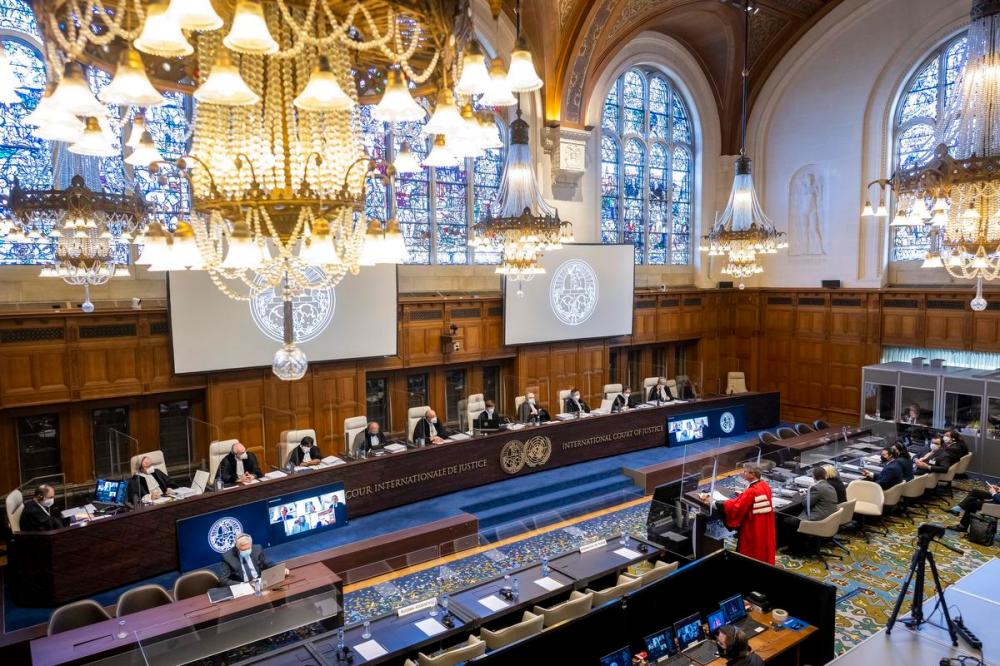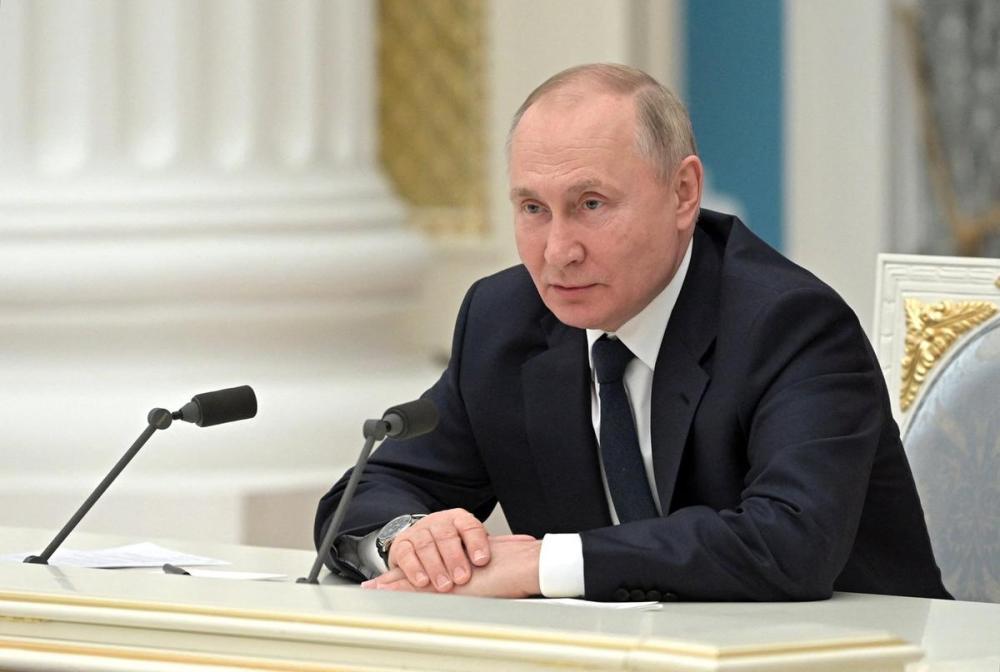What qualifies as a war crime? Could Russia’s Vladimir Putin face justice at the ICC?
Advertisement
Read this article for free:
or
Already have an account? Log in here »
To continue reading, please subscribe:
Monthly Digital Subscription
$1 per week for 24 weeks*
- Enjoy unlimited reading on winnipegfreepress.com
- Read the E-Edition, our digital replica newspaper
- Access News Break, our award-winning app
- Play interactive puzzles
*Billed as $4 plus GST every four weeks. Offer only available to new and qualified returning subscribers. Cancel any time.
Read unlimited articles for free today:
or
Already have an account? Log in here »
Hey there, time traveller!
This article was published 10/03/2022 (1091 days ago), so information in it may no longer be current.
With reports of Russia increasingly targeting civilians as its invasion of Ukraine stretches into its third week, conversations have begun about how Russian President Vladimir Putin might be brought to justice.
The International Criminal Court (ICC) in The Hague is an independent judicial body that investigates and tries individuals charged with the most heinous crimes of concern to the international community — including war crimes, crimes against humanity, genocide and the crime of aggression.
Last week, the court’s chief prosecutor, Karim Khan, announced he was opening an investigation into the situation in Ukraine, after receiving referrals from 39 states that accept the court’s jurisdiction, including Canada. The court has been investigating war crimes and crimes against humanity in Ukraine since 2014.

Speaking Wednesday in Berlin, Prime Minister Justin Trudeau said the ICC will be “extremely important” for “holding Putin himself accountable for the war crimes he is committing presently in Ukraine.”
Russia’s actions have been widely condemned by the international community, and other leaders, such as U.S. President Joe Biden and U.K. Prime Minister Boris Johnson, have echoed the sentiment that Putin will pay personally for his role in the Ukraine invasion.
From a judicial perspective, however, experts say it’s not so simple. The ICC has never prosecuted a sitting leader — and even if Putin were to be overthrown, there are procedural obstacles that would prevent him from getting to The Hague.
Here’s what Putin could be charged with and what it would take for him to face the court.
How do cases get brought to the International Criminal Court?
The ICC only has jurisdiction over crimes committed by nationals of — or in the territory of — states that have signed onto and ratified the court’s founding treaty (called the Rome Statute), or temporarily accepted the jurisdiction of the court.
The court can also be referred cases by the United Nations Security Council — but Russia, as a permanent member of the council, holds a veto over such actions.
Neither Russia nor Ukraine is currently a party to the Rome Statute. Russia withdrew from the court in 2016 over its classification of Russia’s annexation of Crimea as an occupation. Ukraine signed the Rome Statute in 2000 but has yet to ratify it.
However, Ukraine has twice accepted the court’s jurisdiction, once when Russia invaded Crimea in 2014, and a second time on an “open-ended basis.” That means the court can investigate potential crimes committed on Ukrainian territory.
Which of the International Criminal Court’s four offences could Putin be charged with?
In this scenario, the court could charge Putin with war crimes, crimes against humanity, or genocide — and in that order of likelihood, said Frédéric Mégret, professor of law and co-director of the Centre for Human Rights and Legal Pluralism at McGill University.
War crimes are serious breaches of the Geneva Conventions, which are international treaties that regulate armed conflict. Breaches can include the indiscriminate killing of civilians, or the intentional targeting of hospitals — both of which the Russian military has been accused of.
Since the International Criminal Court prosecutes individuals, not states, it likes to go for “the big fish,” Mégret said, meaning the court would more quickly target Putin over a Russian soldier.
However, it can be difficult to prove that a leader is directly guilty of a war crime, he said, because Putin could claim plausible deniability for the actions of his soldiers on the ground.
Another subset of crimes that Putin could be charged with are crimes against humanity, which are widespread or systemic attacks committed against a civilian population.
Khan, the court’s prosecutor said there is “a reasonable basis to believe that both alleged war crimes and crimes against humanity have been committed in Ukraine.”

A crime that would be easier to prove yet impossible to prosecute in this case would be the crime of aggression — in other words, the launching of an unlawful war.
“No one doubts that Putin is guilty of aggression,” Mégret said, but the court can only prosecute individuals from state parties to the Rome Statute for this specific crime.
What needs to happen for Putin to be put in front of the court?
Even if the court gathered enough evidence to charge Putin, getting him to stand trial would be complicated.
“It’s not a question of ‘Are there norms and standards that apply’? The question is ‘Is there any process that could be brought to bear?’ … Hardly,” said John Packer, associate professor of law and director of the Human Rights Research and Education Centre at the University of Ottawa.
Putin would either have to be arrested in a country that accepts the jurisdiction of the court, or surrender himself, or Russia would have to extradite him, which would only happen with a change of regime.
Furthermore, Putin benefits from “head of state immunity,” an international legal principle that protects sitting leaders from being held accountable for their crimes, Packer said. Because the ICC does not have a police force, it relies on states to hand over its accused — and they don’t always comply.
For example, the court had an arrest warrant out for Sudan’s Omar al-Bashir — charged with crimes against humanity, war crimes and genocide committed in Darfur when he was president — for nearly a decade before he was overthrown by a military coup. In the meantime, he travelled to at least 33 countries who did not arrest him, many of them members of the court.
If Putin were to be ousted, Russia could also choose to prosecute him itself. The ICC is meant to be a last resort when countries do not have the ability to prosecute war criminals domestically.
Is it likely that Putin will be tried and convicted by the International Criminal Court for his actions in Ukraine?
The notion of Putin being reprimanded by the court is just “pie in the sky” at this point, Packer said, but there’s no statute of limitations for international crimes — so justice could come later.
In the meantime, Mégret said there’s an opportunity for The Hague to put pressure on Russia by getting field commanders scared about their potential liability so they dissuade troops from targeting civilians.
Beyond the ICC, there are also other avenues for justice, he said, through domestic prosecution, or bodies like the International Court of Justice, which deals with disagreements between states, and the European Court for Human Rights.


